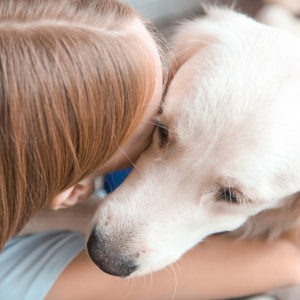I’m one of those people who takes a dog just about everywhere. I hope you’re OK with that. But maybe when you see us coming, you are annoyed if not downright angry.
Meet Bella, my black, 3-year-old, 62-pound pit bull-boxer mix. I take her to lots of places — stores, even for all-day trips to the library. No, she’s not a highly trained service dog, like guide dogs for the blind, nor a therapy dog who gets hugged by strangers in need of comfort.
Bella is my emotional support animal.
I live with bipolar disorder and am under the care of a psychiatrist, who supports my need for Bella and has even written me the required “prescription” that allows her access to public places. Day-in, day-out, I rely on her — stroking her velvety soft ears or rubbing her back — to calm me when I’m about to lose it. She is just as important to me as my daily medications.
I found her accidentally on Craigslist, when I was looking for an ordinary pet dog to keep me company at home. Bella was highly intelligent, obedient and had the necessary laid-back temperament that unexpectedly soothed my mind and helped temper my mental illness.
Petting her keeps me calm, grounded, reduces my stress levels and buffers me from an agitated world. Around her I feel safe. I imbibe her serenity. She’s a kind, loving and patient best friend who I’ve humorously dubbed my “medicine dog,” the newest addition to my roster of bipolar disorder treatments that have included medications, exercise, therapy and rest. Over the years I’ve repeatedly ignored medical advice to do yoga, meditate or practice mind-fullness. They’re boring. I’m better off with Bella around.
Bella has rules. I don’t take her to restaurants, to the gym, to other people’s houses. I don’t walk up to strangers and start conversations with her at my side. Dogs in the pit bull family can scare people. Before I met Bella, they scared me as well.
Fortunately, she’s sweet, quiet and minds her own business. She’s never been asked to leave and nobody seems to hate her — or me. On the contrary, strangers come up to us to chat about dogs. But yes, others keep their distance.
I want people to understand the role dogs can play in our health. Emotional support dogs are becoming popular with those living with serious mental illnesses, including depression, schizophrenia, anxiety disorder, PTSD and bipolar disorder — people like me who can be overly emotional, nervous, afraid and even irritable.
Researchers worldwide have studied the positive effect dogs have on humans. In 2012 an international group of scientists analyzed 69 published research studies about the possible role of dogs increasing their owners’ oxytocin levels. Oxytocin is also known as the “love hormone,” because it is released when people snuggle up or bond socially.
I get it: Emotional support dogs are controversial. Some people believe that pet owners lie about their support animal’s ability to provide any kind of mental health treatment, especially since the internet abounds with stories about support animals such as pigs, lizards and tarantulas, and their owners’ attempts to bring them aboard commercial airplanes to the gasps, if not shouts, of other passengers.
Indeed, with absolutely no evidence of an animal’s training, you can go online to buy vests, leashes, collars, dog tags and even official-looking certificates indicating that your dog is an “Emotional Support Dog,” or even a “Service Dog.”
Many people erroneously think Bella is a formally trained service dog. There are big differences. I had a friend in a wheelchair with muscular sclerosis who had a golden retriever service dog whose skills included opening her front door, turning lights on and off, and fetching her cell phone. He got his own seat and its accompanying floor space, for free, on airplanes.
Bella is not a therapy dog either. These dogs often frequent medical facilities, like VA hospitals and elder-care facilities, accepting hugs and shaking paws. At the one-year anniversary memorial service for the mass shooting in Las Vegas, therapy dogs were out in droves, to comfort the public.
When we go outside, I put an “Emotional Support” vest on her. She knows her job and stays close. At the dog park she avoids other dogs. At home, Bella lies at my feet whether I’m at my desk writing or on the couch watching TV.
Emotional support animals have a big role to play in society. The federal government has granted their owners a few — not many — legal rights, including the right to live with one in a no-pet rental property and the right to take them on a plane. For now, that’s fine by me.

